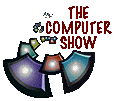HOME
By Al Giovetti
Price:TBA
Genre:action, first person shooter
Release:Christmas 1997
Developer: Ion Storm
Script Writer: Christian Divine
Lead Artist:
Music: Will Loconto
Programmer:
Producer:John Romero
Publisher: Eidos Interactive
Phone:
Web site:
Requirements:TBA

Daikatana
History
John Romero is an icon in the first person shooter category. He has had a hand in Wolfenstein (name stolen from an old out-of-print MUSE game), Doom, Doom II, Heretic, Hexen, and Quake. John left id Software, which he co-founded in 1991 with John Carmack and two others, to form his own company Ion Storm (he likes the letter "I") with 40 employees in Dallas, TX.
One of the reasons why John left id was to get away from the stagnation of the first person shooter. John is quoted as stating the importance of moving on and developing the genre into something different. John wants the first person shooter to evolve significantly, and he feels Ion Storm was the place to lead the revolution.
Company Line
Daikatana will be a first-person shooter based on the Quake engine by id Software. The mastermind behind Daikatana is John Romero, who also designed Wolfenstein, Doom, Doom II, Heretic, Hexen, and Quake. He basically defined the first-person shooter genre and will take it even further by adding role playing elements for Daikatana. The game is projected to be available by Christmas 1997.
The target platform will be a Win32 Windows95 system. Daikatana will support Verite and 3DFX video cards. The network code in the original Quake engine will be modified to allow smoother play over the Internet. According to developers at Ion Storm, Daikatana will most likely use DLLs instead of an Interpreted Quake C mod to encapsulate game play rules. The basic engine should also include some enhancements over the original Quake engine such as translucent objects.
Your character in Daikatana will travel through four different time periods in order to "set things straight". I don't know exactly what that means either, but I'm sure more details about the story line will become available as time goes on. The "Daikatana" in the game will be both your samurai long sword and your time travel device. The four different time periods you will be traveling to in the game are: Ancient Greece (2030BC), The Dark Ages in Norway (560 AD), San Francisco After The Big One, and Distant Future Japan (2030AD and 2455AD). They won't necessarily appear in that order.
Throughout these four settings you will be battling sixty-four different monsters using twenty-six different weapons! I may be speculating here but from my interview with Sverre it sounds like each different time period will have its own set of monsters and weapons. They are considering allowing you to take certain weapons from one time period to another but you probably won't find any ammunition for for those out-of-place weapons. Some weapons will be close combat weapons but most will be range-attack based.
Your character will start off five attributes each set at a base level. As you play through the game you gain experience points. Periodically after gaining so many experience points you will be allowed to increase one of your attributes a single point. A few of the attributes John has mentioned are Attack Power, Speed, and Jumping.
The music in Daikatana is being composed by Will Loconto. Each of the four time periods will have its own style of music. They are planning on having a unique song for each level in the game.
Game Play
What makes this game different than Doom and Quake clones is three things: time travel, role-playing elements, and characters that have to cooperate to succeed.
You go back to four times: Ancient Greece, The Dark Ages in Norway, San Francisco After The Big One, and Distant Future Japan.
Like an skill based role playing game, as your character increases in experience he can allocate points into five attributes which include attack power, speed, and jumping.
You will be required to get involved with your characters, chugalug brewskis, slap each other on the back, share inane banter, and best of all practical jokes (another oxymoron). When your friends die, you will cry and then you will probably die, since survival depends upon cooperation. You will play Hiro Miyamoto and your two friends, Mikiko Ebihara and Superfly (from the 1970's? Is this an Interstate '76 tribute? - Ed.) will have to cooperate with you to succeed.
Plot
While the plot in most first person shooters is superflous, John Romero intends to make the plot in Daikatana more integral to the action. You go back in history to set the timeline right so that the future comes out correctly.
Graphics
Graphics include translucent effects
Animation
Voice Actors
Music Score
The music is composed by Will Loconto to give each of the four time periods in the game its own theme music.Sound Effects
Utilities
Multi-player Features
Cheats, Hints, Walkthrough
Journalists
References
Daikatana Web PageDaikatana Interviews
Ion Storm Stormfront Web Site
V. Long, Computer Gaming World, issue 155, June, 1997, pg. 66 - 68.
